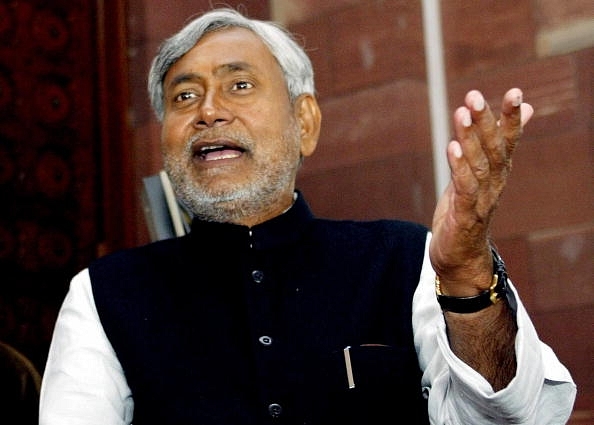Insta
New Prohibition Law Enforced In Bihar After Patna High Court Overturned Liquor Ban

Nitish Kumar must now focus on maintaining law and order in Bihar. Photo credit: RAVEENDRAN/AFP/GettyImages
The Bihar government on Sunday enforced a new prohibition law, two days after the Patna High Court struck down the previous prohibition law, calling it draconian. The government is also set to challenge Patna High Court’s decision striking down the Bihar prohibition law by filing a special leave petition in the Supreme Court.
While the new act has harsher provisions, a window for amendment has been kept open. Informing the members of his cabinet, Nitish Kumar stated that the bill is open to any positive amendment and suggestions will be taken up during the winter session of the state assembly.
On Friday, the Patna High Court struck down the liquor ban, which was imposed by Nitish Kumar’s administration last April. After hearing a petition against the ban, a high court bench termed it "illegal". The court also censured the stringent provisions in Bihar's new excise law
The state government must learn from fellow dry state Kerala, which is showing adverse effects of prohibition. The Kerala government’s move more likely drove alcohol sales underground, creating immense opportunities for a thriving black market. Additionally, tourism also suffered.
In terms of alternatives, there has been a rise in the consumption of ganja and other banned substances, creating a spike in state crime statistics. In 2015, 1,430 cases were registered – after the liquor policy was enforced. And, till August this year, the number of cases have already reached 1,789, said the state's excise minister.
Nitish Kumar can also learn from Gujarat, which has been a dry state since its separation from the Bombay State in 1961. This restriction was not deemed to be as propitious as people would find it.
The hooch tragedy of August 2009, killing close to 148 people in Ahmedabad, showed how imprudent decisions could trigger harmful consequences for the people. They substituted alcohol with even spurious liquor such as hooch.
After the incident, several experts claimed that preventing liquor sale has led to rampant production of spurious liquor.
There are records of various states across India that have gone from banning alcohol to lifting it due to the scarcity of finance in coping with the expenditures of the state. It will be helpful if Nitish Kumar realises that the long-term solution against liquor related crimes cannot be prohibition, but better implementation of law and order.
With inputs from IANS.
Support Swarajya's 50 Ground Reports Project & Sponsor A Story
Every general election Swarajya does a 50 ground reports project.
Aimed only at serious readers and those who appreciate the nuances of political undercurrents, the project provides a sense of India's electoral landscape. As you know, these reports are produced after considerable investment of travel, time and effort on the ground.
This time too we've kicked off the project in style and have covered over 30 constituencies already. If you're someone who appreciates such work and have enjoyed our coverage please consider sponsoring a ground report for just Rs 2999 to Rs 19,999 - it goes a long way in helping us produce more quality reportage.
You can also back this project by becoming a subscriber for as little as Rs 999 - so do click on this links and choose a plan that suits you and back us.
Click below to contribute.
Latest